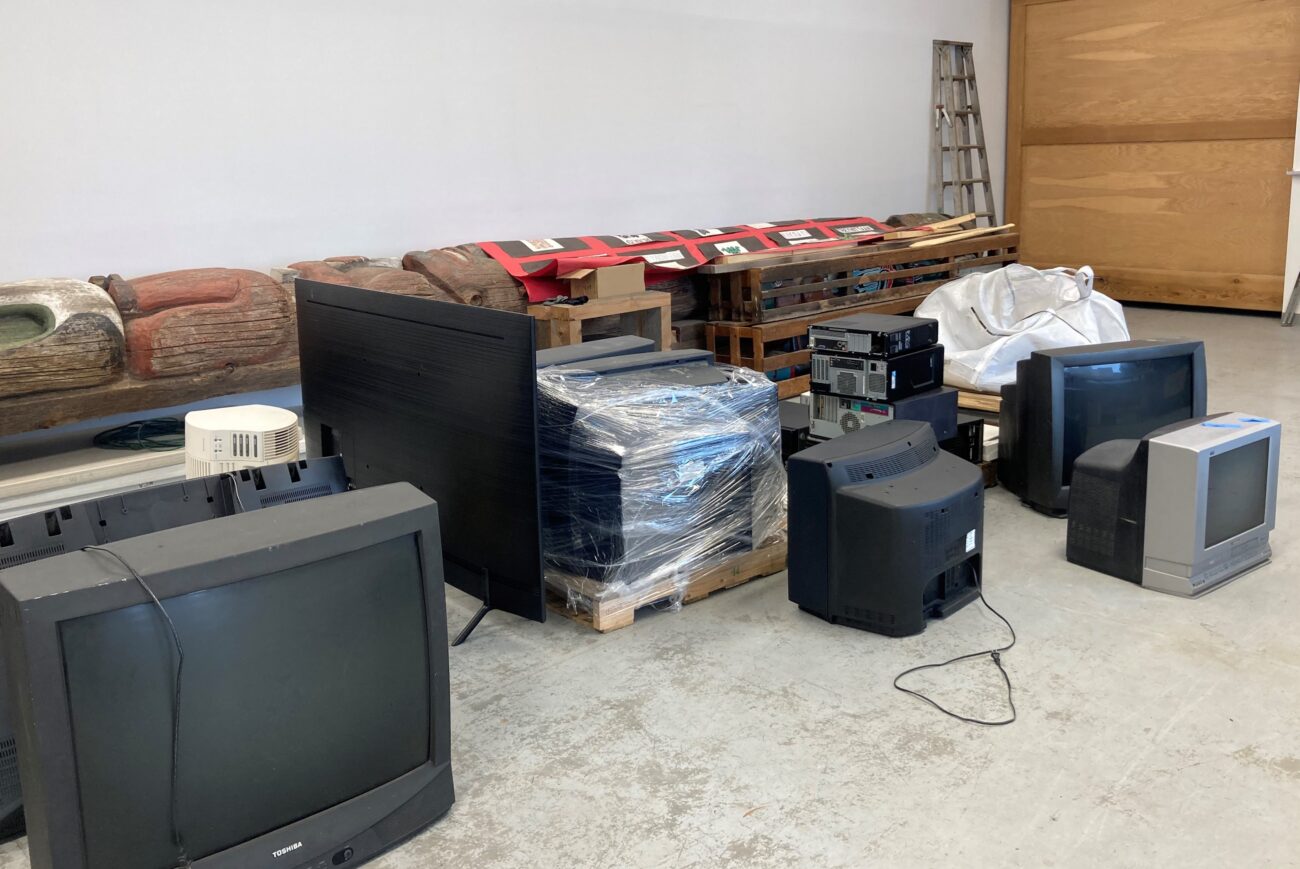
(Courtesy Kim Wickman / WCA)
A Tlingit tribe in the Southeast community of Wrangell — the Wrangell Cooperative Association — has been working to recycle electronics to reduce e-waste. That helps keep potentially toxic materials from becoming hazardous waste on the island.
Waste from old laptops, televisions and other electronics can and should be recycled. But in an area like Southeast Alaska, any shipment of heavy old tech costs more than many individuals or companies can afford. Kim Wickman works for the Wrangell Cooperative Association, a federally recognized tribe. She says piles of old electronics led to some questionable behavior.
“In the past, we’ve seen a lot of computers, computer towers, those type of things being shot at the shooting range, or maybe run over a few times out on a logging road, because people were trying to destroy any information they had on them. They didn’t know what to do with them,” she explains.
Electronic waste is chock-full of harmful and toxic chemicals: heavy metals and flame retardants. When obsolete tech ends up in landfills, it harms air, soil, and water quality, and can cause a variety of issues for humans and animals in the area.
So four years ago, Wickman says Wrangell’s tribe began asking people to hand it over for free: “We realized that this was something we could really pull off in Wrangell, and it could really help us out.”
The collection event they held in March was the tribe’s third in four years.
“In the past,” Wickman says, “We have actually sent out invitations to commercial entities to help them package up their electronic waste separate from the actual e-waste event. And we didn’t do that this year, because we just didn’t have as many volunteers as we normally would, and we just didn’t want to push it with COVID.”
Still, she says they stacked 15 pallets to be shipped off the island: that’s 6,518 pounds of potentially toxic e-waste that could’ve ended up in a landfill — or worse.
Junk electronics are lying around everywhere. Wickman says she even had some of her own to deal with: “I had a Kindle I dropped off. And I had a printer I dropped off. A few things.”
All the waste gets barged down to Kent, Washington, where it is sorted, stripped, and sent along to other recycling facilities.
Total Reclaim is a firm that recycles e-waste from all over the Pacific Northwest, and Gary Smith manages the Alaska accounts.
“Just out of my facility here in Alaska you know what comes in one door it goes out the other that I send down to Kent — we usually average 1.2 million pounds a year,” Smith says.
Smith adds he didn’t think much about recycling before he started working in the business.
“I’ll be honest with you,” he says, “Before I came to work for Total Reclaim, I didn’t know or really wasn’t concerned about recycling and reuse. I was wasteful, just like the general public. But once I saw what was going on, and the amount of rural communities we helped over the years, and basically just learning the science of it — it changed my whole direction on life. I see it as a mission now instead of just a job.”
The tribe isn’t just working on e-waste. It’s also actively working to recycle old fishing gear. Wickman says these efforts cost thousands of dollars.
“One year we’ll do an electronic waste event. And then the following year, we’ll try and do a gillnet recycle shipment. Both are very spendy projects. So we can’t do them every year or do them both in the same year,” she explains.
Wickman says if people missed the recent e-waste collection, don’t despair: “Hang on for a little while. Just put it in a closet somewhere and hopefully in 2023, we will be having an e-waste event.”
Wrangellites should avoid emptying a clip into their old Dell PC, which could pollute the island’s streams and soil.
Get in touch with KSTK at news@kstk.org or (907) 874-2345.












